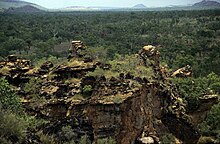Keep River
| Keep | |
|---|---|
 | |
Location of the Keep River mouth in the Northern Territory | |
| Etymology | Henry Francis Keep |
| Location | |
| Country | Australia |
| Territory | Northern Territory Western Australia |
| Region | Victoria Bonaparte (IBRA) |
| Physical characteristics | |
| Source | |
| • elevation | 132 m (433 ft) |
| Mouth | |
• coordinates | 15°08′45″S 129°12′9″E / 15.14583°S 129.20250°E |
• elevation | 0 m (0 ft) |
| Length | 258 km (160 mi) |
| Discharge | |
| • average | 15.8 m3/s (560 cu ft/s) |
| Basin features | |
| Tributaries | |
| • left | Moriarty Creek, Dingo Creek, Knox Creek, Oakes Creek |
| • right | Alligator Creek, Chinaman Creek, Flying Fox Creek |
| [1] | |

The Keep River is a river located in the Victoria Bonaparte bioregion of Western Australia and the Northern Territory in Australia.
Location and features
The river rises just south of the Newry Station homestead then flows in a northerly direction crossing the Victoria Highway and then flowing through the Keep River National Park and veering westward across the border into Western Australia then veering east back into the Northern Territory. It then continues north before discharging into the Joseph Bonaparte Gulf and the Timor Sea.
The river catchment occupies an area of 6,003 square kilometres (2,318 sq mi) and is wedged between the Ord River catchment to the west and the Victoria River catchment to the east.[2] The river has a mean annual outflow of 500 gigalitres (654,000,000 cu yd).[3]
Important wetlands are found in the lower reaches of the river, forming suitable habitat for waterfowl breeding colonies and roosting sites for migratory shorebirds. Large areas of rice-grass floodplain grasslands are also found along the river.[4]
The estuary formed at the river mouth is in near pristine condition.[5] It occupies an area of 230 square kilometres (89 sq mi) of open water. It is tide dominated in nature with a tide dominated delta having multiple channels and is surrounded by an area of 55.5 square kilometres (21 sq mi) covered with mangroves.[6]
Flora and fauna
Riparian vegetation found along the margins in the river include Melaleuca, Barringtonia acutangula, Nauclea orientalis, reeds and taro are common in the upper reaches. In pools along the river sponges such as Spongillidae can be found on rocks.[7] Toward the national park area aquatic vegetation such as species of Nymphea, Hydrilla verticillata and species of Chara become more frequent forming dense mats in some areas. Riparian vegetation includes Melaleuca, Barringtonia acutangula, Nauclea orientalis, Lysiphyllum cunninghamii and Pandanus spiralis.
Marine fauna found along the river include fish including freshwater sawfish, dwarf wawfish, ox-eye herring, bony bream, short-tail thryssa, several species of catfish such as Arius and Anodontiglanis dahli, freshwater longtom, species of rainbowfish, hardeyheads, species of glassfish, species of grunter, species of mullet, spotted archerfish, species of gudgeon, species of goby and baramundi.[7]
In February 2022, the Northern Territory Land Corporation released 67,500 hectares for a planned conversion of the landscape towards the cultivation of rice, cotton and various fruits like mangoes and bananas. The effects of this major project on the natural ecology and Aboriginal sacred sites are not yet known.[8]
History
The traditional owners of the area are the Kadjerong and Duulngari peoples[9] to the northern end and the Miriwoong people to the south.[10]
The origin of the name is not known but it is thought to have been named for Henry Francis Keep who was a store keeper in Wyndham. The first written record of the name was in the diary of explorer and pastoralist, Michael Durack, who wrote about a "trip to Keep River" in 1894.[11]
See also
References
- ^ "Map of Keep River, NT". Bonzle Digital Atlas of Australia. Retrieved 3 May 2015.
- ^ "Drainage Divisions" (PDF). Commonwealth of Australia. 2005. Archived from the original (PDF) on 1 April 2015. Retrieved 3 May 2015.
- ^ "Keep River" (PDF). TRaCK. 2009. Retrieved 12 May 2015.
- ^ "Victoria Bonaparte Bioregional Description". Northern Territory Government. Archived from the original on 27 March 2015. Retrieved 3 May 2015.
- ^ "Australian Catchment, River and Estuary Assessment" (PDF). Natural Heritage Trust. 2002. Archived from the original (PDF) on 13 February 2014. Retrieved 3 May 2015.
- ^ "Keep River, NT". Australian online Coastal Information. Commonwealth of Australia. Retrieved 24 May 2015.
- ^ a b Helen Larson (4 February 1999). "Keep river Aquatic Fauna survey" (PDF). Museums and Art Galleries of the Northern Territory. Archived from the original (PDF) on 6 April 2015. Retrieved 3 May 2015.
- ^ Royce Kurmelovs,‘Water isn’t endless’: the controversial plan to extend irrigated agriculture in NT’s tropical savannah The Guardian 10 April 2022
- ^ "Duulngari". AusAnthrop Australian Aboriginal tribal database. Ausanthrop. 2005. Archived from the original on 27 September 2015. Retrieved 3 May 2015.
- ^ "Miriwung". AusAnthrop Australian Aboriginal tribal database. Ausanthrop. 2005. Archived from the original on 11 September 2015. Retrieved 3 May 2015.
- ^ "Place Names Register Extract - Keep River". NT Place Names Register. Northern Territory Government. Retrieved 2 May 2015.

